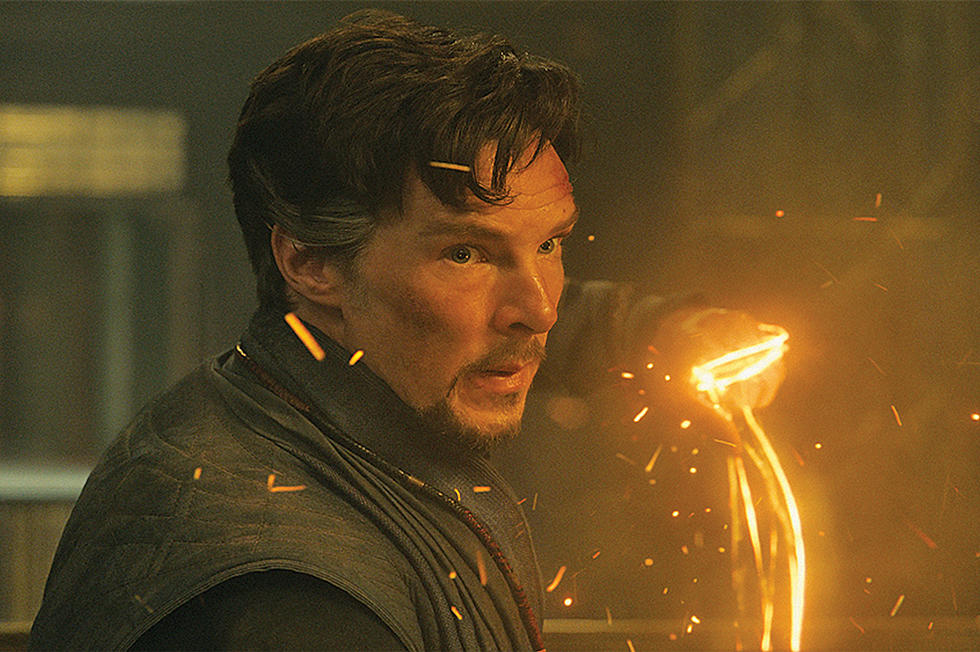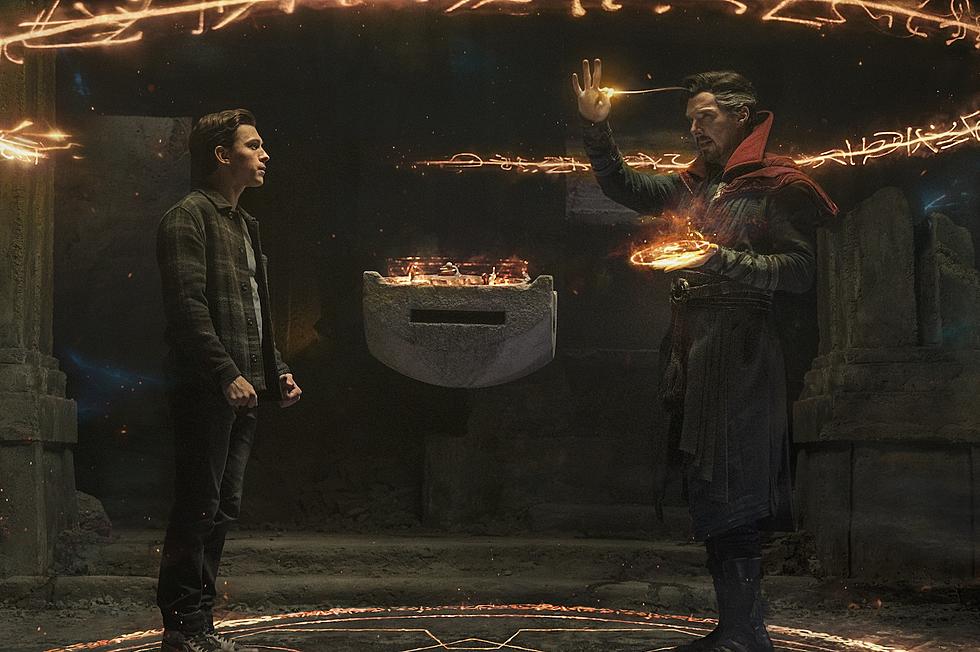
Matthew Goode on ‘The Imitation Game’ and Benedict Cumberbatch No Longer Complaining About His Career
It’s a little jarring to listen to Matthew Goode refer to Benedict Cumberbatch as, simply, “Ben.” Since the two became friends, “Ben” has gone on to become one of the most famous people on Earth and the subject of countless Internet memes. The name “Benedict Cumberbatch” has a life of his own—and it’s never just “Ben.”
I suspect Matthew Goode has a fun time ribbing his friend about his newfound fame, as he takes a couple of, let’s say, good-natured (yet endearingly sincere) “shots” at his longtime friend. Say, for instance, when Goode is discussing his supporting role as code breaker Hugh Alexander in ‘The Imitation Game,’ Goode makes sure to mention that his character is “the embryonic membrane that keeps Ben’s talent from exploding.” Or, later, telling how “Ben” used to be on Goode’s sofa lamenting, "God, my career’s not going anywhere.” After this story, when I tried to follow up, Goode chuckled and hung up the phone. (I get the sense it would be fun to hang out with Matthew Goode and Benedict Cumberbatch.)
Matthew Goode has a way of being the best thing in a lot of movies, even without a lot of starring roles. In ‘The Imitation Game,’ he is surrounded by talented actors (and actors getting Oscar buzz), yet, still, Goode is a standout as the rival and sometimes friend of Alan Turing —the man who helped break the Nazi code and was then punished by his own government for being gay, which eventually led to Turing’s suicide. Ahead, in an extended interview (we had enough time that even ‘Chasing Liberty’ was brought up for reasons I can’t 100 percent defend), Goode discusses his what-should-be-awards-buzzing performance and why he can’t be in as many movies as we’d maybe like him to be.
Benedict Cumberbatch and Keira Knightly are getting much deserved praise, but do you feel you’re a little under the radar? You shouldn’t be.
Well, that’s very kind of you. I think in terms of statuettes, it wasn’t something that I signed onto thinking. I don’t think anyone signs on, really, certainly as supporting, thinking they’re going to garner that kind of attention. [The supporting cast] is basically the embryonic membrane that keeps Ben’s talent from exploding. That’s what we do. That’s very kind of you to say something, but I don’t feel I’ve been lost in it, I’m just very happy to have been in it … ultimately, it’s a story about Alan Turing, not us.
Even though Hugh Alexander is an adversary of Turing, you don’t play him as someone we completely hate. And when he comes to Turing’s defense, it’s a great moment.
Turing used to rib him, saying, “You’re almost as imposing as me, but not quite.” And I don’t think that necessarily comes across in the movie … so, he was almost as much as a genius as Alan.
By the end of filming, did you understand how Turing’s machine worked?
Obviously it’s a film set, so we had plenty of down time, so we’re all struggling to do crosswords just to keep ourselves amused. We also did sit down at length and tried to have an understanding of it, but, ultimately, as I’m sure Eddie Redmayne would admit to for ‘The Theory of Everything,’ there are some things that our minds just cannot get—it’s not what we’re trained in, it’s not how our minds work.
I spoke to Eddie Redmayne and he said he did a ton of research and feels he could fake his way through a six-and-a half-minute lecture with no questions.
[Laughs] Well, that’s not bad! That’s pretty good.
Could you fake your way through a six-and-a-half minute lecture?
Collectively, we could have done it, at the beginning. But, now, it’s so far off the fact, you forget a lot of stuff. I’m sure that Benedict probably can.
Watching this movie, it’s still shocking to see how horrible Britain’s laws were concerning gay rights.
Homosexuality was illegal in 1952. We are slightly ahead of America on many things—slavery, for example—but what were the rules on homosexuality in America? Was that not illegal as well? Or was it highly frowned upon?
Being gay was never technically against the law, but there were sodomy laws.
But surely America was sending people to prison as well, so it wasn’t just the English.
That is accurate, but what we see in the movie is still shocking.
You mean the hormone therapy replacement kind of thing?
It is shocking.
The thing is, he was given a choice. It was disgusting and the laws, thankfully, are no longer in place because we need to live in a society, now, that doesn’t judge about how anyone else makes love—unless, obviously, it’s with children, because that’s pretty awful and that shouldn’t happen. But, ultimately, he was given a choice between going to prison and having the hormone therapy—being turned, effectively, into a woman. It reduced his libido. And he chose the chemical castration because he wanted to work on his machine and, ironically, the hormones started to mess with his mind. So, if he had gone to prison—even though the outrageous shame he would have felt—he would have come out without his mind being affected. He may not have committed suicide. We don’t know; we’ll never know, but that’s one of the reasons this story is so horrific. It’s a disgrace. It’s not just Alan Turing, who is a gay icon; it’s the 40,000 other people who went to prison because someone decided that isn’t how life should be.
You should be in more movies.
Yeah, I’ll try.
People enjoy you in movies.
It’s not easy when you’ve got kids. You have to make some pretty unselfish decisions. I’ve been lucky. I’m about to finish ‘The Good Wife’ and ‘Downton Abbey,’ we’ll see what happens.
Last time we spoke, you addressed the rumors that you were up for Superman in ‘Man of Steel’ and mentioned you were looking forward to seeing it. What did you think?
Well, I haven’t seen it properly yet. I tried watching it on a plane and I was like, “Hang on, I really should do this service on a big screen.”
You have mixed feelings on ‘Watchmen,’ would you ever want to go down that route again? You seem to have a good relationship with Zack Snyder.
If Zack phones up and wants to have a conversation about something and I have a script in front of me, I think as long as I have an understanding of the history of the character and I could literally see what the drawings of him were and I felt like I could take the character on and do it real justice, then I would never say “never.” But, I’d be surprised. It would take a little transformation, I’d imagine.
I was flipping through channels and came across ‘Chasing Liberty.’ I completely forgot you were in that movie.
Yeah, it was a long time ago. It was really fun, though. I got to film in Venice and Prague with Mandy Moore and Jeremy Piven—it was really fun.
It was a movie aimed at teenagers...
Yeah, it was like a teen romance kind of thing. But I was in my early 20s then, it’s not like you can suddenly leave drama school and go and select, “Oh, I’m going to go and do a Michael Mann film.” It came up and it seemed like a very good opportunity. And I was still learning my craft and no matter what the film is, you have to go on and do it and try to get better and better.
But a lot of people can get stuck in a role like that and that didn’t happen to you. I was honestly surprised in an, “Oh, yeah, that’s right,” way.
[Laughs] If I was in a teen romance now, I think I’d be creepy. Age defies that kind of thing.
That’s all I have. Best of luck with ‘Imitation Game’...
I’m so proud of Ben. I’ve known him for such a long time and the last couple of years he’s really come to the forefront. Which stops him from being on my sofa going, “God, my career’s not going anywhere.” And now it’s impossible for him to walk down the streets.
Wait, that happened?
I’ve got to go! [Click]
Mike Ryan has written for The Huffington Post, Wired, Vanity Fair and GQ. He is the senior editor of ScreenCrush. You can contact him directly on Twitter.
More From ScreenCrush









